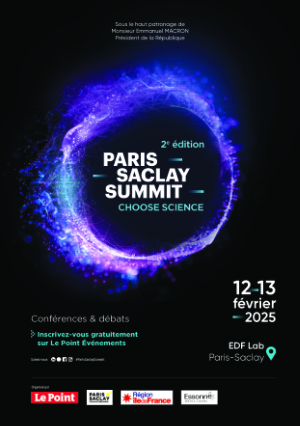PhD project in synthetic organic chemistry and chemical biology / Synthesis of isotope labelled probes and their application in the model organism Caenorhabditis elegans
| ABG-127578 | Thesis topic | |
| 2024-12-14 | Public/private mixed funding |
- Chemistry
- Biology
Topic description
The objective of this PhD research project is the multistep total synthesis of several stable isotope labelled molecular probes and their application in incorporation experiments in order to elucidate biosynthetic pathways in the model organism Caenorhabditis elegans.
The nematode C. elegans represents one of the best understood multicellular organisms in science, but its chemistry and secondary metabolism has remained largely enigmatic. Ongoing research at the laboratory for bioanalytical chemistry aims to decipher the metabolic pathways that connects fatty acid metabolism with the biosynthesis of highly conserved glycolipids, which act as signaling molecules and regulate nematode development and behavior.
In order to unambiguously establish precursor-product relationships in nematode glycolipid biosynthesis, the candidate will synthesize a diversity of stable isotope labelled potential precursors and subsequently apply them in incorporation experiments using C. elegans wildtype and mutants defective in specific steps of the biosynthetic pathway. Incorporation will be established using state of the art HRMS and NMR techniques.
This project will combine synthetic organic chemistry, isotope incorporation experiments, comparative metabolomics, reverse genetics, and biosynthetic pathway elucidation. In addition, the PhD candidate will have the opportunity to contribute to other research projects at the laboratory for bioanalytical chemistry.
Starting date
Funding category
Funding further details
Presentation of host institution and host laboratory
The Laboratory for Bioanalytical Chemistry at the University of Neuchâtel (Switzerland) invites applications for a PhD research position at the interface of natural products chemistry, biosynthetic studies, and comparative metabolomics. The PhD candidate will work under the supervision of Prof. Stephan von Reuss (stephan.vonreuss@unine.ch).
The objective of this position is to design, perform, and analyze high quality scientific research experiments that contribute to the elucidation of the biosynthetic steps that connect fatty acid metabolism with the biosynthesis of highly conserved nematode glycolipids. Meaningful and significant results will be presented on conferences, published in scientific journals, and should be described in the candidates PhD thesis to ultimately earn a PhD title in Chemistry.
While the major focus of this position is research for the PhD thesis and scientific publications, PhD students at the Institute of Chemistry are also responsible for the supervision of practical laboratory courses for undergraduate students and the supervision and training of apprentices at the. Furthermore, PhD students have the opportunity to participate in PhD-level courses in organismal biology / chemical ecology as part of her/his doctoral work at the faculty of sciences.
The Laboratory for Bioanalytical Chemistry provides the advantages of a small research institution with well-equipped laboratories for total synthesis, nematode cultivation, and natural product isolation, along with privileged access to state of the art analytical techniques, such as UPLC-HR-MS and a 600 MHz NMR instrument via the Neuchâtel Platform for Analytical Chemistry (NPAC), which represents an excellent environment for enthusiastic, self-motivated, and independent young researchers eager to develop their skills and scientific profile.
PhD title
Country where you obtained your PhD
Institution awarding doctoral degree
Candidate's profile
Applicants require a MSc degree in Organic Chemistry, Natural Products Chemistry, Chemical Biology, Life Sciences, or a closely related field.
Demonstrated practical experience in the multistep synthesis of organic molecules (preferable natural products), including work with a Schlenk line, column chromatography, and structure analysis by NMR and MS techniques is essential.
Furthermore, basic knowledge of secondary metabolism and molecular biology is required for PhD candidates to quickly develop a solid understanding of biosynthetic pathways (especially fatty acid biosynthesis and β-oxidation) and their elucidation via isotope labelling strategies, comparative metabolomics, and reverse genetics.
Practical experience in sterile culture techniques for microbiology & nematology work is an advantage, but also possible to learn on the job.
Very good command of English (reading, writing, speaking) is required. Basic knowledge of French for teaching duties is highly desirable.
Successful PhD candidates are expected to design, execute, and analyze high-quality experiments, show self-motivation in order to independently develop their own research projects and accumulate meaningful and significant results, while being available to collaborate with team members and external collaborators and contribute to other research projects with their expertise and skills.
Vous avez déjà un compte ?
Nouvel utilisateur ?
Get ABG’s monthly newsletters including news, job offers, grants & fellowships and a selection of relevant events…
Discover our members
 TotalEnergies
TotalEnergies  Groupe AFNOR - Association française de normalisation
Groupe AFNOR - Association française de normalisation  Aérocentre, Pôle d'excellence régional
Aérocentre, Pôle d'excellence régional  MabDesign
MabDesign  ADEME
ADEME  Institut Sup'biotech de Paris
Institut Sup'biotech de Paris  ONERA - The French Aerospace Lab
ONERA - The French Aerospace Lab  Tecknowmetrix
Tecknowmetrix  CASDEN
CASDEN  ANRT
ANRT  CESI
CESI  Nokia Bell Labs France
Nokia Bell Labs France  PhDOOC
PhDOOC  Laboratoire National de Métrologie et d'Essais - LNE
Laboratoire National de Métrologie et d'Essais - LNE  Ifremer
Ifremer  MabDesign
MabDesign  Institut de Radioprotection et de Sureté Nucléaire - IRSN - Siège
Institut de Radioprotection et de Sureté Nucléaire - IRSN - Siège  SUEZ
SUEZ  Généthon
Généthon




